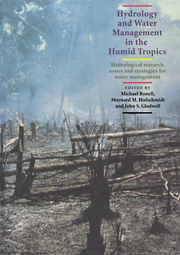 Hydrology and Water Management in the Humid Tropics
Hydrology and Water Management in the Humid Tropics Book contents
- Frontmatter
- Contents
- List of Authors
- Foreword by Federico Mayor, Director-General, UNESCO
- Preface
- Cartographic Credit
- Acknowledgements
- SECTION I INTRODUCTION
- SECTION II HUMID TROPICS SETTING
- 2 Climate and Rainfall Variability in the Humid Tropics
- 3 Operational Hydrology Problems in the Humid Tropics
- 4 The Problems of the Humid Tropics – Opportunities for Reassessment of Hydrological Methodology
- SECTION III REGIONAL HYDROLOGY
- SECTION IV PHYSICAL PROCESSES
- SECTION V PHYSICAL PROCESSES – HUMAN USES: THE INTERFACE
- SECTION VI MANAGEMENT ISSUES
- SECTION VII APPENDICES
- Place index
3 - Operational Hydrology Problems in the Humid Tropics
Published online by Cambridge University Press: 23 December 2009
- Frontmatter
- Contents
- List of Authors
- Foreword by Federico Mayor, Director-General, UNESCO
- Preface
- Cartographic Credit
- Acknowledgements
- SECTION I INTRODUCTION
- SECTION II HUMID TROPICS SETTING
- 2 Climate and Rainfall Variability in the Humid Tropics
- 3 Operational Hydrology Problems in the Humid Tropics
- 4 The Problems of the Humid Tropics – Opportunities for Reassessment of Hydrological Methodology
- SECTION III REGIONAL HYDROLOGY
- SECTION IV PHYSICAL PROCESSES
- SECTION V PHYSICAL PROCESSES – HUMAN USES: THE INTERFACE
- SECTION VI MANAGEMENT ISSUES
- SECTION VII APPENDICES
- Place index
Summary
ABSTRACT
Each of the major fields of activity within operational hydrology is considered. A number of the particular problems faced in the humid tropics are identified and discussed from a practical point of view. Possible solutions are reviewed and the overall conclusion is drawn that the principal barrier to progress is the low priority assigned by governments to water-resource assessment.
INTRODUCTION
Operational hydrology has a pivotal role in the development of water management for without the quantitative data it provides, no analysis of problems or estimation of the effectiveness of solutions are possible. In this paper, the authors look at many aspects of operational hydrology in the humid tropics. They indicate those areas where they feel there is scope for advancement and indicate what improvements they consider to be appropriate.
In preparing this paper, the authors have chosen to highlight typical problems as they exist rather than to attempt a comprehensive but general overview. Such an overview could never be truly comprehensive and would not stimulate consideration of the real practical difficulties faced in the field. Many other examples of problems and solutions, therefore, can be added to those cited below. The reader is invited to expand the list to suit specific circumstances.
The scope of the paper covers operational hydrology from the measurement of parameters in the field through to the preparation of data for analysis. Given that many of the countries in the humid tropics are classed as developing countries, the authors give more weight to such countries. The authors cite a number of examples from their own experience to give anecdotal evidence in support of their arguments and proposals.
- Type
- Chapter
- Information
- Hydrology and Water Management in the Humid TropicsHydrological Research Issues and Strategies for Water Management, pp. 34 - 44Publisher: Cambridge University PressPrint publication year: 1993
- 2
- Cited by
